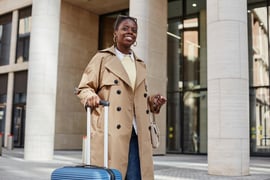What does the corporate travel industry have in store for 2023?
What does the corporate travel industry have in store for 2023?
Here are the top trends so far.
Once more, the winds of change are blowing in the world of corporate travel.
The business travel industry has always had to be ready to adapt, resulting in a chameleon-like ability to reinvent itself in the face of change.
But in more recent years, the need to respond has been relentless. Of course, there was the pandemic. A cost of living crisis. Sky-high energy prices. Air and rail strikes. Not to mention the ripple effects caused by the UK’s departure from the EU.
Then you add the issue of sustainability into the mix and how companies are having to step up their game and find new ways to reduce their carbon footprint.
It’s a lot to navigate. But there is positive growth, with the reopening of China’s borders, new efficiency-building technologies, and a focus on improving processes and procedures.
And of course with big changes, new trends emerge. Often fast moving, and often hard to keep up with.
In this article, we’re going to be focusing on the main trends in the corporate travel industry so far in 2023.
Let’s take a look.
#1 Longer business trips
The pandemic gave time for pause – and re-evaluation.
People (and businesses) are now putting more thought into the way they travel, resulting in longer business trips.
There’s been a noticeable dip in one-day trips (only 4.4% of bookings accounted for this duration), seeing travellers combining more trips, not travelling as often, or extending their trips to combine different events and meetings in one go.
It’s likely due to a multitude of reasons: sustainability, “bleisure”, and the increased focus on well-being. But often due to financial issues, companies are also starting to question how necessary trips are and looking at how they can make them more efficient.
#2 Technology is no longer a nice-to-have
Employees are expecting more from their business trips.
Gone are the days of them diligently collating expense receipts, juggling different payment methods, or waiting in a queue to buy a train ticket during rush hour.
They want the ease of use and the same simplicity that they have in their personal lives: the consumer experience.
Contactless payments (fast-tracked by the pandemic) have become the normal expectation for business travel – and companies are now being forced to keep up. In fact, contactless transaction payments are looking set to double1 by 2027 alone.
And now we’re seeing more and more business travellers adding their boarding passes and train tickets to their digital wallets, like Apple Pay and Google Pay; they want to manage their expenses from their phone too.
The simplicity of scanning, capturing, and submitting receipts with just a few clicks is a far cry from the arduous task of collecting receipts for expenses en route.
#3 China rises in popularity as a destination
As of early 2023, international borders were at long last truly open to the world again – meaning that key players in the corporate travel industry were back in business.
China was the last to ease its entry restrictions, but it’s bouncing back in style and rising up the ranks as a popular business travel destination.
In fact, the Global Business Travel Association estimates that the Chinese market will reach approximately 89 percent of its pre-pandemic level in 20232 with an 18.9 percent increase in business travel spending.
#4 A surge in self-booking
More and more corporate travellers are opting to book their trips themselves.
Faced with lengthy approval processes and outdated processes, many were finding that getting the green light for trips was proving difficult – and often approved at the last minute.
Employees being allowed to book their own travel is showing benefits in the form of time-saving and an overall better employee experience. And this level of autonomy is now being incorporated into companies’ travel policies.
Millennials and Gen-Z employees are the biggest fans of self-booking their travel. They’re likely more comfortable with online booking procedures and want to book hotels and flights that suit their personal preferences.
#5 The rise of AI, VR, and intelligence assistants
Big things are happening in the world of AI. And with virtual reality and intelligence assistant developments also picking up the pace, big changes are afoot.
In fact, in a survey by Statista, 75% of participants indicated they would trust AI to make travel bookings3, with a main focus on accommodation.
Here are the main developments we’re seeing so far in 2023:
- Travel suppliers are harnessing the power of AI to reveal business travellers’ preferences, make predictions, and take advantage of opportunities to upsell.
- Virtual reality is starting to enable personalisation, allowing employees to choose room choices based on their tastes and personal preferences.
- Intelligent assistants are upping their competencies, with products such as Siri and Google Now handling more and more complex tasks. Tasks such as automatically updating employee travel itineraries when travel disruption has occurred, and even recommending alternative routes.
#6 The demand for sustainability
The demand for more sustainable travel is growing, and there’s no sign of it levelling out.
According to a study by Deloitte,4 four in 10 European companies and a third of US companies are saying they need to reduce travel per employee by more than 20% to meet their 2030 sustainability targets.
Companies are wanting to show their commitment to the cause, with travel managers focused on sourcing the most eco-friendly options when booking flights and accommodation.
There’s no doubt that investing in greener choices is the future, but this involves much research and a long, hard look at financial capabilities.
Also, many companies will be able to choose whether or not to participate in a carbon offsetting scheme, in order to compensate for their own carbon emissions produced through travel activity.
#7 Events are back in business
Videoconferencing was a much-appreciated fallback during the pandemic. But it seems that people still prefer to meet in person. With opportunities for real-life meetups back on the table, corporate event planning is also back with a bang – and it’s come back transformed.
According to Deloitte, live event attendance has leapt from the fifth-biggest trigger for increased spend in 2022 to the top spot in 2023.
That being said, digitisation is still a main player in every corner of the travel industry, and event planning is no exception. And with it the popularity of hybrid and virtual events is on the rise, with many companies opting for a mix of in-person and online events. Resulting in companies saving on costs, increasing attendee numbers, and reducing their carbon footprint.
#8 Mixing business with leisure
When you’re working and regularly travelling for a global company, “bleisure” has become a big trend.
According to a GBTA survey,6 37% of corporate travellers extended their business trips last year by adding vacation days to them.
With remote working the new norm, hotels had to up their game, such as by providing fast WiFi and comfortable spaces to work, meaning employees can now combine a corporate trip with their own activities.
Bleisure is now seen as essential for well-being and makes longer-haul flights a more enjoyable experience – ultimately increasing the energy and productivity of employees and reducing the chances of work burnout.
Key takeaways
- Businesses and travellers are choosing longer business trips. Due to often combining business trips with “bleisure” and being mindful of the need to make trips more sustainable and cost-effective.
- AI and virtual reality are on the rise, with companies being able to use them to predict behaviour and tailor experiences based on preferences.
- The corporate travel industry is seeing a rise in self-bookings, especially among millennial and Gen-Z employees.
- China is rising in popularity as a business travel destination since it opened its borders earlier in the year.
- New technologies and approaches are continuing to enter the industry, with a sharp focus on replicating the consumer experience when travelling for business.
And remember, if you’d like to explore how AirPlus corporate payment solutions can help your business, be sure to get in touch with us directly! Or meet with us at the Business Travel Show on 28 – 29 June.
Sources
1 https://www.juniperresearch.com/pressreleases/contactless-payments-transaction-values-to-surpass, Contactless payments transaction values to surpass $10 trillion by 2027, Juniper Research
2 https://agbrief.com/news/china/08/05/2023/chinas-business-travel-demand-soars-while-overall-business-expenditure-increases-white-paper/ , China’s business travel demand soars while overall business expenditure increases, Asia Gaming Brief
3 https://www.statista.com/statistics/1381319/expected-use-artificial-intelligence-for-travel-planning-worldwide/ , Share of users that would trust using AI for business travel bookings,, Statistica
4 https://www2.deloitte.com/uk/en/insights/focus/transportation/corporate-travel-study-2023.html , Navigating towards a new normal: 2023 Deloitte corporate travel study, Deloitte insights
5 https://www2.deloitte.com/uk/en/insights/focus/transportation/corporate-travel-study-2023.html , Navigating towards a new normal: 2023 Deloitte corporate travel study, Deloitte insights
6 https://www.stnet.ch/app/uploads/2021/08/GBTA-2017_Bleisure_Study_Preview.pdf , Extending business travel into leisure time - Bleisure study.











